T-90
The T-90 main battle tank, the most modern tank in the army arsenal, went into low-level production in 1993, based on a prototype designated as the T-88. The T-90 was developed by the Kartsev-Venediktov Design Bureau at the Vagonka Works in Nizhniy Tagil. Initially seen as an entirely new design, the production model is in fact based on the T-72BM, with some added features from the T-80 series. The T-90 features a new generation of armor on its hull and turret. Two variants, the T-90S and T-90E, have been identified as possible export models. Plans called for all earlier models to be replaced with T-90s by the end of 1997, subject to funding availability. By mid-1996 some 107 T-90s had gone into service in the Far Eastern Military District.
Derived from the T-72, the GPO Uralvagonzavod T-90 is the most modern tank currently in service with the Russian Army. Of conventional layout, the T-90 represents a major upgrade to every system in the T-72, including the main gun. The T-90 is an interim solution, pending the introduction of the new Nizhny Tagil MBT which has been delayed due to lack of funding. Produced primarily mainly due to its lower cost, the T-90 it will probably remain in low-rate production to keep production lines open until newer designs become available. Several hundred of these tanks have been produced, with various estimates suggesting that between 100 and 300 are in service, primarily in the Far East.
The T-90 retains the 125-mm 2A46-series main gun of the T-72 and T-80 which is capable of firing APDS, HEAT and HE-FRAG projectiles as well as time-fuzed shrapnel projectiles. The Refleks 9M119 AT-11 SNIPER laser-guided missile with a hollow-charge warhead is effective against both armored targets and low-flying helicopters. The missile, which can penetrate 700-mm of RHAe out to 4000 meters, gives the T-90 the ability to engage other vehicles and helicopters before they can engage the T-90. The computerised fire control system and laser range-finder, coupled with the new Agave gunner's thermal sight, permit the T-90 to engage targets while on the move and at night. However, this first generation system is probably not as capable as current Western counterpart systems. The tank is fitted with precision laying equipment and an automatic loader to guarantee a high rate of gun fire. Secondary armament includes a coaxial 7.62mm PKT machine gun and 12.7mm machine gun mount to for air and ground targets.
The T-90 features the low silhouette of the earlier Russian tanks, with a low rounded turret centered on the hull, and is fitted with combined passive and active defenses which make the T-90 one of the best protected main battle tanks in the world. The glacis is covered by second generation explosive reactive armor [ERA] bricks, as is the turret. This ERA gives the turret an angled appearance, with the ERA bricks forming a "clam shell" appearance. ERA bricks on the turret roof provide protection from top-attack weapons.The T-90 is equiped with the TShU-1-7 Shtora-1 optronic counter measures system which is designed to disrupt the laser target designation and rangefinders of incoming ATGM. The T-90 is also equipped with a laser warning package that warns the tank crew when it is being lased. Shtora-1 is an electro-optical jammer that jams the enemy�s semiautomatic command to line of sight (SACLOS) antitank guided missiles, laser rangefinders and target designators. Shtora-1 is actually a soft kill, or countermeasures system. It is most effective when used in tandem with a hard kill system such as the Arena. During the International Defense Exposition (IDEX) held in Abu Dhabi in 1995, the system was shown fitted to a Russian MBT. The first known application of the system is the Russian T-90 MBT that entered service in the Russian Army in 1993. Shtora-1 is currently installed on the T-80UK, T-80U, T-84 and T-90 MBTs.
The Shtora-1 system comprises four key components, the electro-optical interface station, which includes a jammer, modulator, and control panel; a bank of forward-firing grenade dischargers mounted on either side of the turret that are capable of firing grenades dispensing an aerosol screen; a laser warning system with precision and coarse heads; and a control system comprising control panel, microprocessor, and manual screen-laying panel. This processes the information from the sensors and activates the aerosol screen-laying system. Two infrared lights, one on each side of the main gun, continuously emit coded pulsed infrared jamming when an incoming ATGM has been detected. Shtora-1 has a field of view of 360-degrees horizontally and -5 to +25-degrees in elevation. It contains 12 aerosol screen launchers and weighs 400kg. The screening aerosol takes less than 3 seconds to form and lasts about 20 seconds. The screen laying range is between 50-70 meters.
The T-90 is powered by the V-84MS 618 kW (840 hp) four-stroke V-12 piston multi-fuel diesel engine, which can also run on T-2, TS-1 kerosene and A-72 benzine. This engine results in a power to weight ratio of only 18.06 hp/ton, considerably less than that of the T-80. The tank crew can prepare fording equipment within 20 minutes to negotiate 5 meter deep water obstacles. The tank is also fitted with the NBC protection system and mounted mineclearing equipment.VARIANTS
There are at least three different variants of the T-90. The Russians confirmed the existence of an export variant in June 1996 with varying equipment and engine fits, and Russian promotional materials have discussed both the T-90S (or �C� in the sometimes-used Cyrillic non-translation) and the T-90SK command variant. The T-90K command variant differs in radio and navigation equipment and Ainet remote-detonation system for HEF rounds. There are also occasional references to a T-90E, but these appear to be unsubstantiated. As of mid-2000 India planned to acquire T-90 tanks, based on field trials which had already been completed. Although orders had been placed for the supply of 124 Arjun tanks through the Defence Research Development Organisation, it would be difficult to predict when these orders would be fufilled. Until such time, T-90 tanks would serve to counter Pakistan's T-85 tanks.Specifications | |
| Dimensions | |
| Length | 9.53 - 6.86 meters |
| Width | 3.78 meters |
| Height | 2.225 meters |
| clearance | 0.47 meters |
| Weight | 46.5 - 50 metric tons |
| Armored volume | 11.04 m3 |
| turretvolume | 1.85 m3 |
| Crew | 3 |
| Engine | 840 hp V-84MS diesel 1,000 hp V-84KD turbo-supercharged diesel 1,000 hp V-85 diesel 1 kW AB-1-P28 auxiliary power unit |
| Max Road Speed | 65 km/h |
| Max cross-country Speed | 45 km/h |
| Power/Weight | 18 - 20.0 hp/tn |
| Ground Pressure | 0.938 kg/sq.cm |
| Range | 550 - 650 km |
| Obstacle negotiation | |
| Fording depth | 1.2 m on the move/5 m with OPVT (snorkel) |
| Trench width | 2.8 m |
| Vertical obstacle | 0.8 m |
| Maximum gradient | 30� |
| Weapons | |
| Main Weapon | 125mm 2A46M-2 smoothbore |
| Stabilization | 2E42-4 Zhasmin |
| Rate of fire | 6-8 rounds/min |
| Ammunition | 43 rounds (22 in carousel) |
| Ammunition Types | APFSDS, HEAT, HEF |
| ATGM through 125mm | 9M119M Refleks-M (AT-11 Sniper-B) |
| Machine Guns | Coaxial PKT 7.62mm (2000 rounds) Remotely-controlled AAMG mount Utjos NSVT 12.7mm (300 rounds) |
| Smoke Screens | 12 902B 82mm mortars with 3D17 smoke grenades smoke discharger |
| Equipment | |
| Night Vision | TO1-PO2T Agava-2 TI (target id range 2.5 km) TPN-4-49-23 Buran-PA (target id range 1.2/1.5 km) |
| Fire Control | 1A45T Irtysh computerized system with 9S515 missile guidance system |
| Onboard sights | |
| Commander | PNK-4S sight includes TKN-4S Agat-S day/night sight (target id range 800 m (day)/700 m (night)) |
| Gunner | 1V528-1 ballistic computer 1A43 rangefinder/sight 1G46 laying device DVE-BS wind gauge |
| Driver | TVN-5 IR night viewer |
| Radio | R-163-50U R-163-50U + R-163-50K (T-90K) |
| Navigation | TNA-4-3 (T-90K) |
| Jammers | Shtora-1 EOCMDAS Dazzle painting |
| Other | NBC, 3ETs13 Inej auto-fire-fighting equipment, self-dig-in blade, air conditioning, KMT-6 mine clearing equipment (optional) |
| Front & side armor | laminated front, side and top armor behind Kontakt-5 ERA |
| Front armor rating, mm RHA |
vs APFSDS: 550 mm + 250-280mm with Kontakt-5 = 800-830mm vs HEAT: 650 mm + 500-700mm with Kontakt-5 = 1,150-1,350mm |
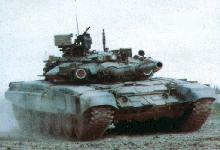
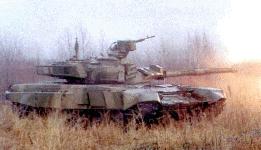
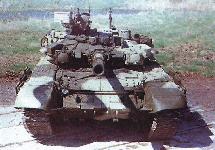
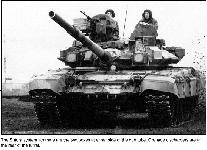
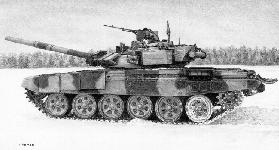
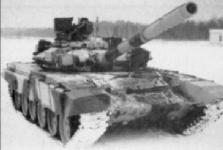
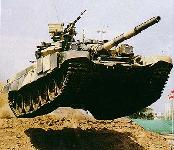
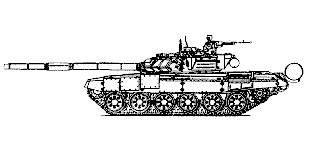
Sources and Methods
- The Russian T-90S: Coming into Focus by James M. Warford ARMOR � September-October 1997
- India to purchase latest T-90s from Russia ASSOCIATED PRESS OF PAKISTAN NEWS SUMMARY (05-11-1999) India will soon purchase around 300 T-90 tanks from Russia for around Rs 10.50 crores each, for deployment in offensive formations in Rajasthan and Punjab by next year. T-90 tank will swiftly" kill" Arjun, the main battle tank developed locally after 25 years.
- T-90 MBT by Vasiliy Fofanov
- T 90S - Main Battle Tank @ army-technology.com



